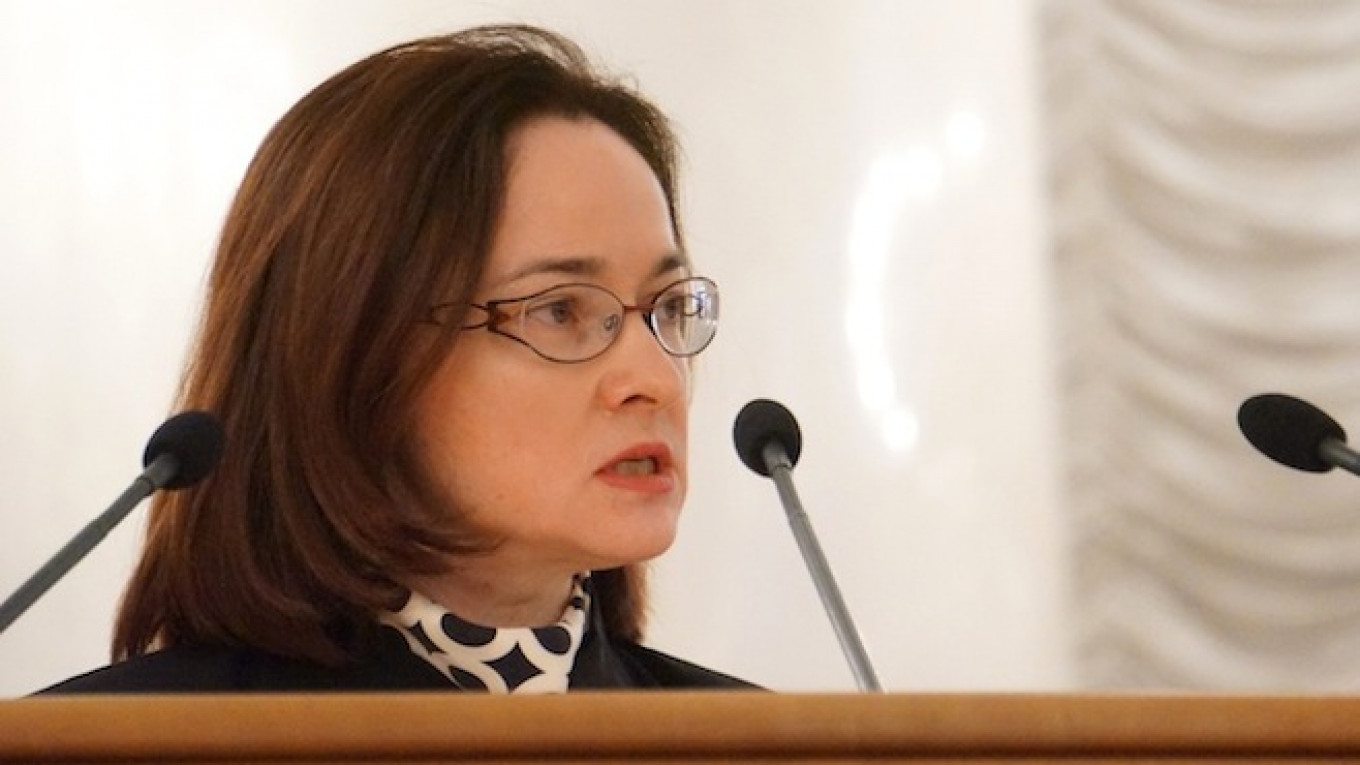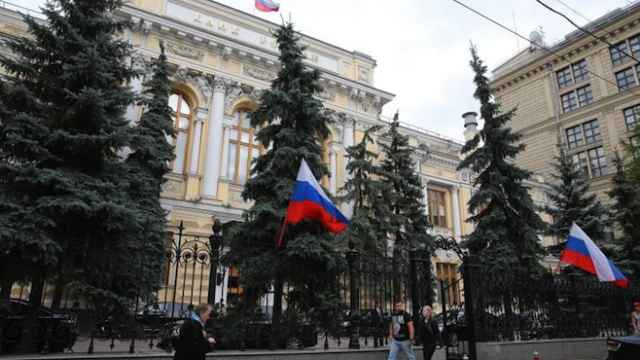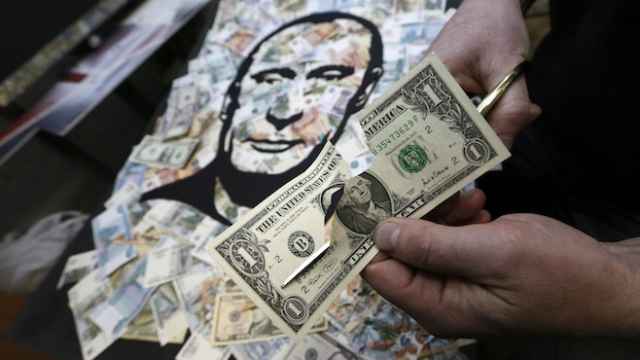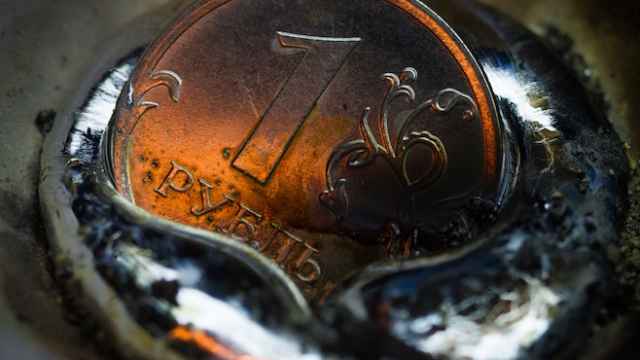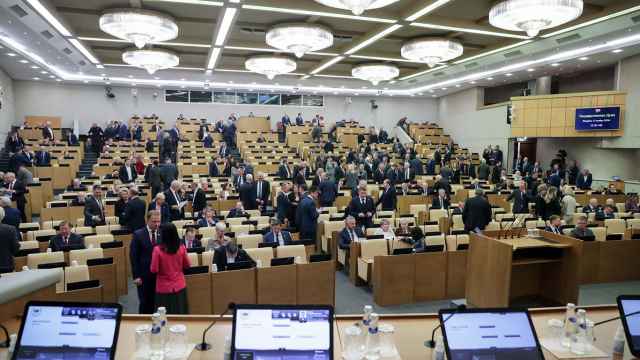Reaching the climax of a personal attack on Russia's Central Bank chairwoman Elvira Nabiullina in a debate in the State Duma early last week, Communist deputy Vyacheslav Tetyokin did not hold back.
Nabiullina, he said, was “the most expensive woman in the history of our country.”
Tetyokin was incensed by the more than $70 billion of foreign currency reserves the Central Bank has burned through defending the ruble this year as it has been battered by Western sanctions on Moscow and a steadily sliding oil price.
In a much-anticipated monetary policy switch, the Central Bank announced last Monday that it was ceasing interventions on currency market except in the case of threats to financial stability: meaning the ruble was now fully free-floating.
Criticism of 51-year-old Nabiullina, an economist born near the Ural Mountains with a reported passion for French poetry, has stepped up in recent weeks as the Russian currency's dramatic volatility prompts uncomfortable recollections of the country's traumatic 1998 default.
The ruble has weakened over 30 percent against the U.S. dollar since the beginning of the year and, in a crash that caused U.S. dollar supplies to dry up at retail banks, plunged 10 percent in 48 hours to a record low of 48.6 versus the greenback on Nov. 7.
Close to Putin
For the six years prior to her appointment as Central Bank chief last year, Nabiullina worked alongside President Vladimir Putin.
After serving as Economic Development Minister between 2007 and 2012, Nabiullina, who has spent most of her career in government service, followed Putin to the Kremlin as an economic adviser. She was a surprise choice for the top Central Bank position, which was vacated in 2013 by the long-serving Sergei Ignatyev after 11 years in the post.
Economists and analysts expressed concern at the time that Nabiullina was too linked to Putin to be independent, and the concerns still linger over a year later.
“They mishandled the transition to the free float quite badly,” said one Western banker in Moscow who requested anonymity because he was not authorized to speak to the media.
“I don't completely blame the Central Bank management team. … It may have been a political requirement,” he said.
Putin largely refrained from commenting publicly on the ruble's troubles as devaluation gathered pace in October, but said several times that Russia would not “mindlessly burn through” its reserves, which now amount to about $420 billion.
The move to a free float means the Central Bank is no longer required to sell reserves to curb the ruble's decline.
Foreign currency reserves are now one of the few instruments left available to the Kremlin to mitigate the effects of an economy teetering on the brink of recession. A cease-fire between government forces and pro-Russian separatists in Ukraine appears to be on the verge of collapse, raising fears of further sanctions from the U.S. and the European Union.
A New Kudrin?
Nabiullina's position in debates within the government over inflation, which has soared to over 8 percent this year, and the falling ruble has prompted some analysts to draw comparisons between her and former Finance Minister Alexei Kudrin.
A key figure during his tenure as Finance Minister between 2000 and 2011, Kudrin was admired amongst investors and his international counterparts for his fiscal conservatism.
Kudrin resigned following public disagreements with then-President Dmitry Medvedev over policy, in particular defense spending.
Nabiullina worked closely with Kudrin, her ministerial colleague, during the 2008 financial crisis to develop an emergency lending plan to limit the damage to the economy.
Many of Nabiullina's decisions at the Central Bank, including her campaign to tighten oversight in the financial sector and allow the currency to free float, have been praised by economists.
“From an economic and public relations point of view the authorities have done everything correctly,” the influential Vedomosti business daily wrote in an editorial on Nov. 11, the day after the Central Bank implemented the free float.
Others said however that the comparison with Kudrin was only true up to a point.
“She is not afraid to stand up to many interest groups,” said one prominent Russian economist who requested anonymity to speak freely.
“But she cannot argue with Putin and she will not resign over a policy issue.”
'Hard, Precise and Demanding'
Born to a working family in Ufa, the capital of the Bashkortostan republic, in 1963, Nabiullina is married to the rector of Moscow's Higher School of Economics, Yaroslav Kuzminov.
She enjoys poetry and her favorite authors include Anna Akhmatova and Paul Verlaine, according to a Bloomberg report last year just before her accession to the Central Bank.
Aside from Duma deputies like Tetyokin, who tinge their allegations of incompetence with misogyny, Nabiullina has faced more sustained opposition from hardline Kremlin figures represented by Putin adviser Sergei Glazyev.
Rumored to have lost out to Nabiullina in the race for the Central Bank job, Glazyev has publicly called for the imposition of capital controls and for the Central Bank to impose a fixed interest rate. Nabiullina has dismissed these proposals.
“Nabiullina is hard, precise and demanding,” said Anton Danilov-Danilyan, deputy head of business lobbying group Business Russia (Delovaya Rossiya) and a student acquaintance of Nabiullina.
“She is an economic liberal,” said Danilov-Danilyan, who worked alongside Nabiullina on the board of directors at Sberbank, the biggest of Russia's state banks. “She has always been like that and always will be.”
Contact the author at h.amos@imedia.ru
A Message from The Moscow Times:
Dear readers,
We are facing unprecedented challenges. Russia's Prosecutor General's Office has designated The Moscow Times as an "undesirable" organization, criminalizing our work and putting our staff at risk of prosecution. This follows our earlier unjust labeling as a "foreign agent."
These actions are direct attempts to silence independent journalism in Russia. The authorities claim our work "discredits the decisions of the Russian leadership." We see things differently: we strive to provide accurate, unbiased reporting on Russia.
We, the journalists of The Moscow Times, refuse to be silenced. But to continue our work, we need your help.
Your support, no matter how small, makes a world of difference. If you can, please support us monthly starting from just $2. It's quick to set up, and every contribution makes a significant impact.
By supporting The Moscow Times, you're defending open, independent journalism in the face of repression. Thank you for standing with us.
Remind me later.



